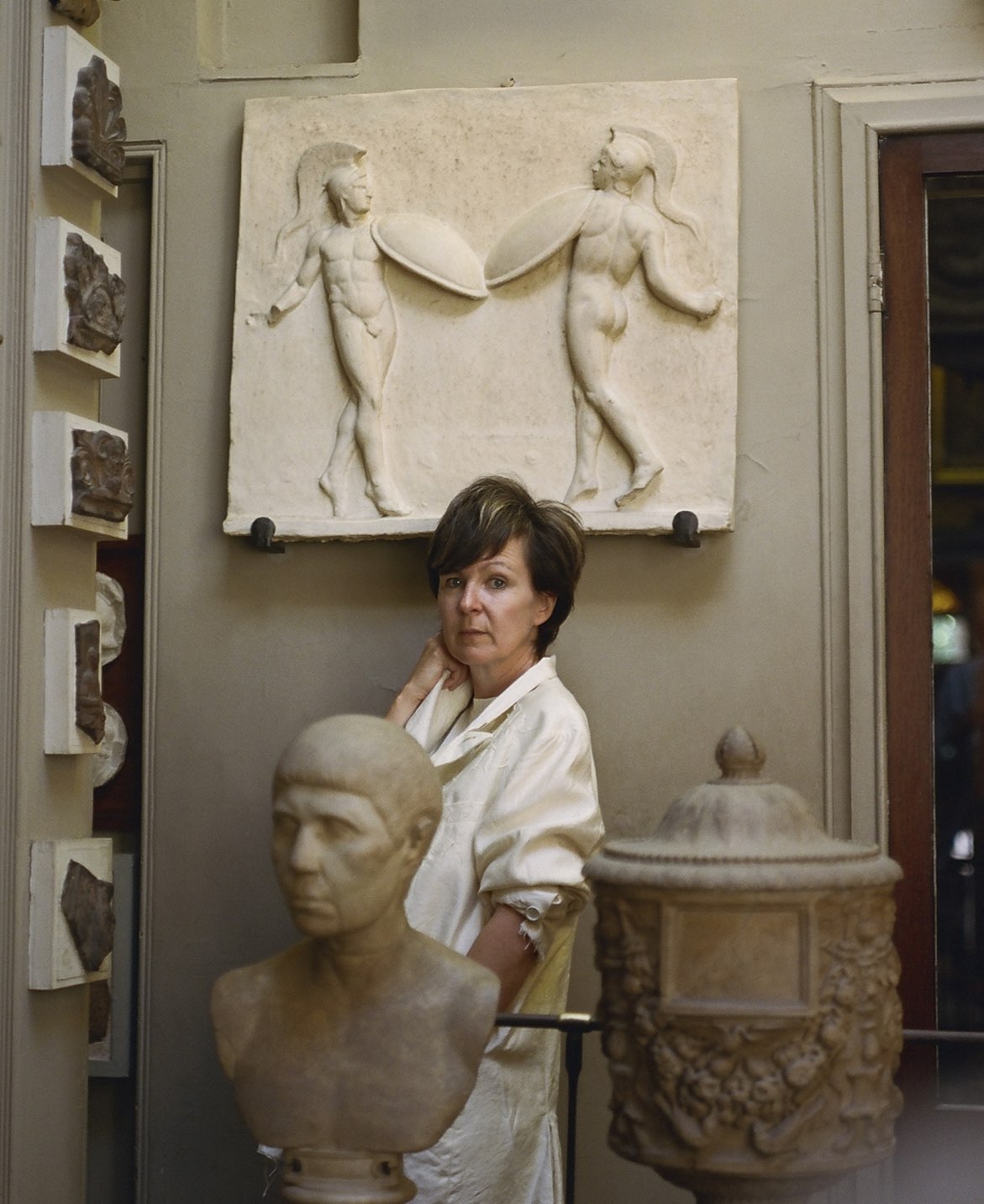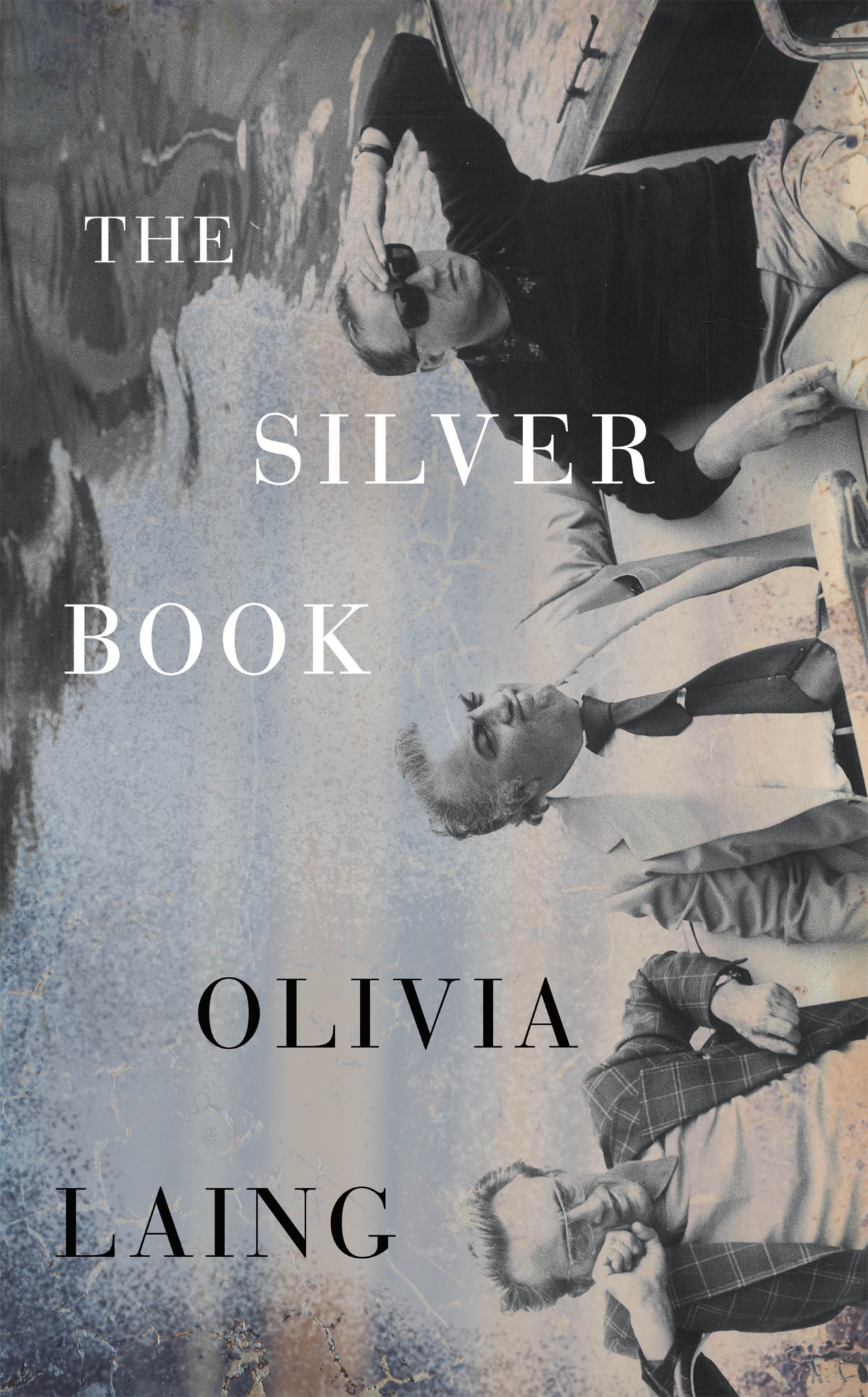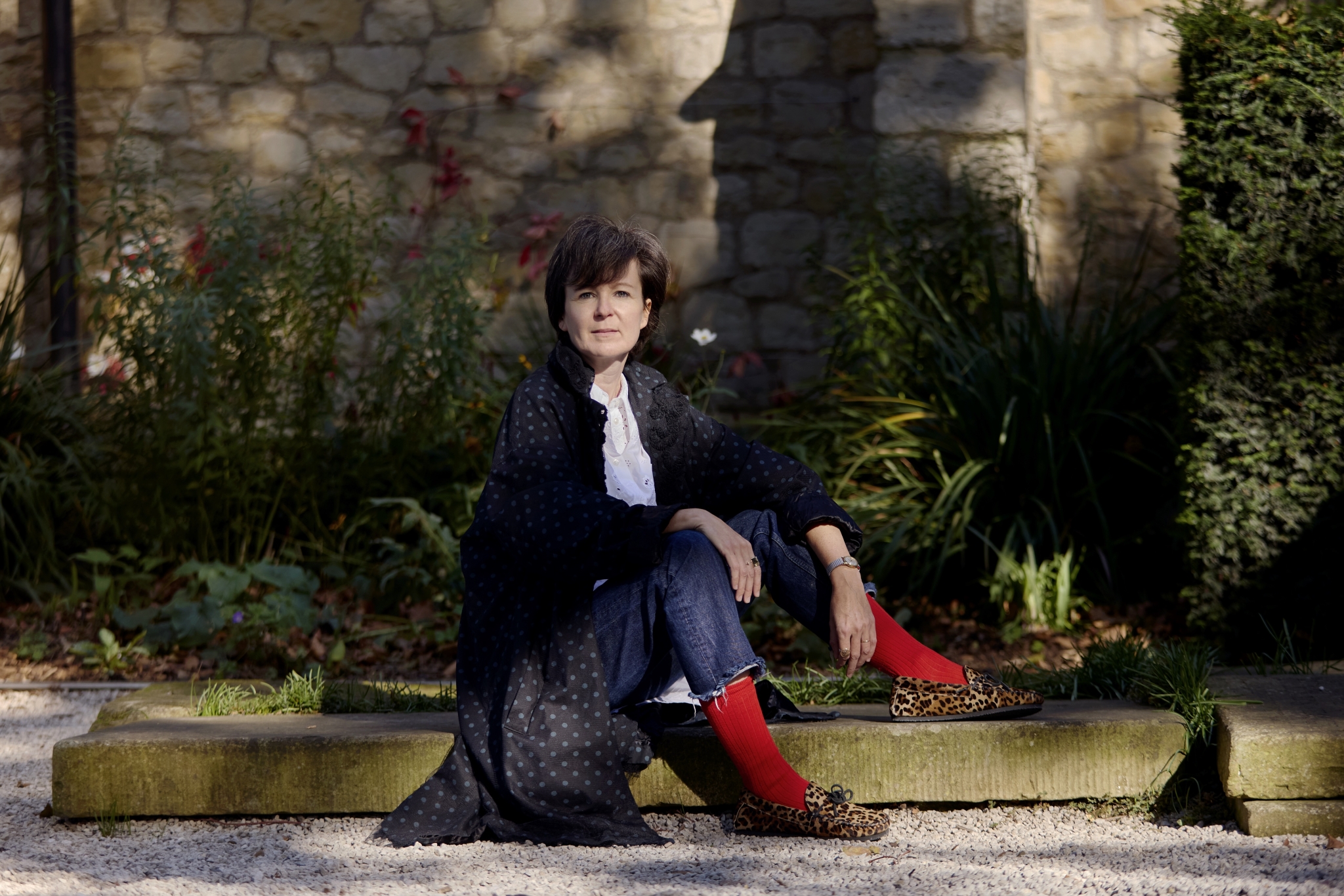
“Pasolini’s political poet who foresaw everything that’s happening in our world… I love Fellini’s faith in humans as dreaming animals.” Olivia Laing discusses finding inspiration from two masters of Italian cinema in their latest book.
Released a year apart, Salo, or The 100 Days of Sodom (1975) and Casanova (1976) are two masterful, although radically different classics of Italian cinema. Yet the former, Pasolini’s punishing allegory of fascism, and the latter, Fellini’s oneiric portrayal of a libertine are linked by one person: Danilo Donato—a costume designer who was key in bringing the imagination of both directors to light.
Donato is a key figure in The Silver Book, the latest book by writer and cultural critic Olivia Laing, whose celebrated non-fiction works include Funny Weather (2020), The Lonely City (2016) and The Garden Against Time (2024). Their second work of fiction since Crudo (2018), The Silver Book traces the story of Nicholas, a young man on the run from London, who washes up in Venice and into the arms of Donato, who spots the English boy sketching “on the corner of Campo Santo Stefano. He looks like Vivaldi, the Venetian priest, with his pale skin, his flaming hair… a Renaissance angel.”
In Venice a love affair ensues, before the pair, now as designer and assistant, journey to Rome, where Fellini is busy recreating the splendour of Venice on the stages of Cinecittà for Casanova (a cursed production during which Fellini bullied Donald Sutherland). Pasolini’s production of Salò follows, with Nicholas finding himself seduced by the visionary director, his assassination—The Silver Book is published on its 50th anniversary—arriving as a looming climax.
Below, Olivia Laing speaks to A Rabbit’s Foot about writing the book in Rome, David Bowie and finding inspiration from the language of cinema.
Kitty Grady: There’s something lovely about reading fiction books about cinema, and the creation story behind the films. Where did the desire to write this book come from? And was there a particular detail that unlocked the story for you?
Olivia Laing: I’d been thinking about Pasolini for a long time. I wanted to put him in my last book, but he didn’t quite fit. I got more and more interested in the story of his murder and the idea that the film reels from Saló were stolen and used to lure him to the murder site. Then a few years ago, I realised that reels were stolen from Fellini’s Casanova, too, and that much of the same crew had worked on both films. I became obsessed with Danilo Donato, the costume designer on both films. I liked the idea of him being a central character. Then when I was in Venice in the summer of 2023, I was in a water taxi leaving the city on the lagoon and I suddenly had this very powerful image of Donato walking across Campo Santo Stefano and seeing this red-headed English boy sitting on the steps drawing. And this electric coup de foudre that led to an intense love affair, but also brought chaos in its wake.
KG: And—hopefully it’s not a spoiler—but did you always intend for this story to end with the horror of Pasolini’s murder?
OL: For some people [it’s a spoiler], but some people don’t know what happened to Pasolini. Or some people do, but as they are reading this they think, maybe it won’t happen, that I’ll rewrite it. I always knew it was going towards the murder, but initially I was thinking that Nico would watch the whole murder. It wasn’t until I was writing that scene that I realised oh no, he’s going to turn away. And there will be this suspended moment before everything hits the floor.
KG: I couldn’t help but feel while reading that, as a writer, you preferred Pasolini to Fellini. Am I right?
OL: I love them both. But Pasolini’s the visionary. He’s a political poet who foresaw everything that’s happening in our world. He saw that fascism would come back, that it would merge with capitalism, that it would bring ecological degradation and social decay. He really foresaw the sort of world we find ourselves in now. But I also love Fellini. I love his joyfulness and his faith in humans as dreaming animals. His films are so uplifting and melancholy. Although Fellini was being very bad at this point in his life, torturing Donald Sutherland…

The Silver Book (2025), published by Hamish Hamilton.
“Fellini was being very bad at this point in his life, torturing Donald Sutherland…”
Olivia Laing
KG: I found it interesting that Nicholas, your main character and entry point into the story is a British man who sort of washes up into the city and story like an alien. Did you need an outsider to frame this story about the seduction of cinema?
OL: I love the idea of an outsider appearing. It’s like The Man Who Fell To Earth. The sense that somebody just appears in a world. At the beginning I thought he’d be this very manipulative, talented Mr. Ripley kind of character. As soon as I started writing I realised he wasn’t that at all. He’s someone who is damaged by homophobia and incredibly young and like all young people he thinks he’s at the centre of things and doesn’t understand that he’s actually really at the periphery, that he’s being manipulated. I was really thinking about the film Victim (1961) , a film about homophobia and blackmail of gay people in the 1960s and 70s period. That’s what Nicholas is running away from and he finds this ragingly glamorous world and its thrilling.
KG: The title of The Silver Book, it made me think of that Sylvia Plath poem, ‘Mirror’. And the theme of symmetry and mirrors is so important in the novel. Can you talk about where that theme came from?
OL: From the depths. I knew straight away it would be called The Silver Book. It emerged really naturally because both of the films are packed full of mirrors. In Casanova, there’s this beautiful mirror, and in Salo, there’s a chamber that has really ornate mirrors on either side. A lot of the time they’re building sets or arranging designs and walking past these mirrors and I started realising it’s so much about reflection and forgery and fakery and which self is the real self. In Italy the book title translates as ‘the silver mirror’. It’s a world of imagination and fabrications. And you get this point in the middle where Nicholas doesn’t even know which world is real anymore.
KG: I was reflecting on how, in a way, cinema is the most labour intensive of art forms. This thing of endles production that can be at odds with the glamour and beauty one experiences while watching a film. When you were writing how did you strike that balance between laborious process and its end product?
OL: I got absolutely fascinated by the secret world behind the film. I’ve always liked films about making films. 8½ is the classic example. It’s fascinating as a writer to go into a world that I don’t know about. How would they solve this problem? Where do they put the costumes when they’re shooting on location? How do they physically get all the people there? A friend of mine is friends with [director] Kevin McDonald and I got in touch to be like, do you hire a bus? He gave me all these really granular answers, because I was putting it all together from documentaries and going to Cinecittà. In the book, the people making it aren’t enchanted or seduced by it. It’s very down to earth for them. And I think that’s such a Roman sensibility. Sure, we’re making this marvelous thing today and we don’t care. What’s for lunch?
KG: And cinema of course is its own language, so I’m wondering what as a writer, did you learn about language, while working on The Silver Book?
OL: That’s a good question. It was a strange book to write because I usually write nonfiction, which is slow and laborious. But this one came quickly: I started it in September and finished by mid-November. It felt like watching a film in my head and simply writing down what I saw and heard. The process was visual, immediate, almost like translation rather than writing. I was borrowing from cinema, thinking in cuts and shots, so the book became very visual, direct, and economical, with no excess or overshoot (like Pasolini when making Saló). Somebody the other day who was interviewing me kept saying, ‘so when I watched The Silver Book’, and I said you didn’t watch it, you read it. It’s a book!
KG: There was a line that really stood out to me: “A tailor’s job but also that of a hangman.” Can you elaborate on this metaphor?
OL: I was thinking about the making of Salò and how its creators were a generation who had lived through fascism. They came of age under it, many as gay men, and that fear and anger shaped them deeply. I imagined them working on Salò, inevitably drawing on their own memories. Danilo, for instance, returned to the landscape of his youth, watching reenactments of Nazi soldiers arresting two boys on bikes, when he had once been one of those boys.
Art became a reckoning: he wasn’t just stitching costumes, he was exposing what fascism looked like, insisting we not forget. And it struck me that while we often treat the director as the film’s sole creative force, in great films everyone contributes something drawn from their own psyche, politics, and experience. Shifting the focus away from Pasolini revealed that—the makeup artist, the costume designer, everyone was thinking, feeling, remembering.

Olivia Laing. By Ione Saizar.
“Art became a reckoning: he wasn’t just stitching costumes, he was exposing what fascism looked like, insisting we not forget.”
Olivia Laing
KG: And what was the experience of writing the book like? Does the setting you are in affect your writing?
OL: Almost all of it was written in Rome or on various trains to Mantua or Venice. But it was written in a really tight period. It’s crazy to think that this time last year I hadn’t even finished it. I wanted it to come out for the 50th anniversary of Pasolini’s murder. Rome is such a powerful, sensually compelling city and I was living at the British School on the other side of the Borghese Gardens, and if I took a break I would walk through the gardens, down to the Tiber, and check out where Danilo took Nico to buy a shirt, or where they bought the ice cream. I really needed that sense of the city being present as a character—so when I’m talking about what the Tiber looks like the morning after a storm, that had to be precise.
KG: I loved the David Bowie references. Why did he make it in?
OL: I mean, I love Bowie, but also I really wanted to think like, Nicholas in 1974, Diamond Dogs had just come out, and Nicholas is going to be a little bit obsessed with it. Bowie is very of the feeling of the book–that silveriness and that magician who takes a step too far into a dark world in the 1970s, the period of Thin White Duke and his cocaine psychosis.
KG: There’s a disclaimer about truth at the end of the book. What truths did you let go of, and how did you think about the question of veracity?
OL: That’s a good question. I stayed true to the historical record where it existed—every location from Salò, for instance, is precisely identified, even though the film makes them seem like one house. Some of Pasolini’s dialogue comes directly from his own writings and final interview, so it feels as if he’s speaking through time. But I also invented scenes, imagined conversations with Fellini, for example—to capture what might have been said. After years of nonfiction, it was liberating to use imagination, as long as I stayed truthful to what I knew about Pasolini’s murder: that it was a political assassination.
KG: There are references to cruising and the everyday queer life—were you thinking about your characters as part of a larger queer history?
OL: I wanted the book to feel realistic and detailed, especially in how it represents desire. Danilo cruises one way, Nico another, and Pasolini has his own distinct relationship to cruising. It isn’t a single, uniform activity. Each character’s sexuality is specific, shaped by their history, temperament, and the world they move through. Underneath that, there’s an unspoken bond between the gay men in the book: the shared knowledge of existing in a world that hates them.
I’m a trans writer working in the twenty-first century, in a world where we are hated, so I felt that connection deeply. The anger, sorrow, and defiance that run through the story come directly from how it feels to live now. I also grew up in a gay family in the 1980s, so the book carries many layers of queer history. The devastation wrought by homophobia is one of its main driving forces; it shapes the characters’ lives and particularly motivates Nicholas.
I also wanted them to feel the opposite: the community that survives and thrives within that fear. There’s love, joy, sex, and a fierce sense of beauty that arises in resistance to hatred. That’s where the heart of the book lies: in the power of queer creativity to build an alternative world, even inside oppression. Danilo, especially, embodies that spirit—his determination to make a world of warmth and beauty, however temporary or fragile, is its own kind of victory.
The Silver Book is published by Hamish Hamilton.





